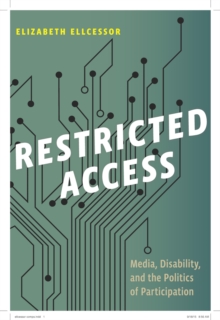Description
| Product ID: | 9781479813803 |
| Product Form: | Hardback |
| Country of Manufacture: | GB |
| Series: | Postmillennial Pop |
| Title: | Restricted Access |
| Subtitle: | Media, Disability, and the Politics of Participation |
| Authors: | Author: Elizabeth Ellcessor |
| Page Count: | 272 |
| Subjects: | Media studies, Media studies, Disability and the law, Disability & the law |
| Description: | Select Guide Rating How reconsidering digital media and participatory cultures from the standpoint of disability allows for a full understanding of accessibility. While digital media can offer many opportunities for civic and cultural participation, this technology is not equally easy for everyone to use. Hardware, software, and cultural expectations combine to make some technologies an easier fit for some bodies than for others. A YouTube video without closed captions or a social network site that is incompatible with a screen reader can restrict the access of users who are hard of hearing or visually impaired. Often, people with disabilities require accommodation, assistive technologies, or other forms of aid to make digital media accessible—useable—for them. Restricted Access investigates digital media accessibility—the processes by which media is made usable by people with particular needs—and argues for the necessity of conceptualizing access in a way that will enable greater participation in all forms of mediated culture. Drawing on disability and cultural studies, Elizabeth Ellcessor uses an interrogatory framework based around issues of regulation, use, content, form, and experience to examine contemporary digital media. Through interviews with policy makers and accessibility professionals, popular culture and archival materials, and an ethnographic study of internet use by people with disabilities, Ellcessor reveals the assumptions that undergird contemporary technologies and participatory cultures. Restricted Access makes the crucial point that if digital media open up opportunities for individuals to create and participate, but that technology only facilitates the participation of those who are already privileged, then its progressive potential remains unrealized. Engagingly written with powerful examples, Ellcessor demonstrates the importance of alternate uses, marginalized voices, and invisible innovations in the context of disability identities to push us to rethink digital media accessibility. How reconsidering digital media and participatory cultures from the standpoint of disability allows for a full understanding of accessibility. |
| Imprint Name: | New York University Press |
| Publisher Name: | New York University Press |
| Country of Publication: | GB |
| Publishing Date: | 2016-03-29 |


